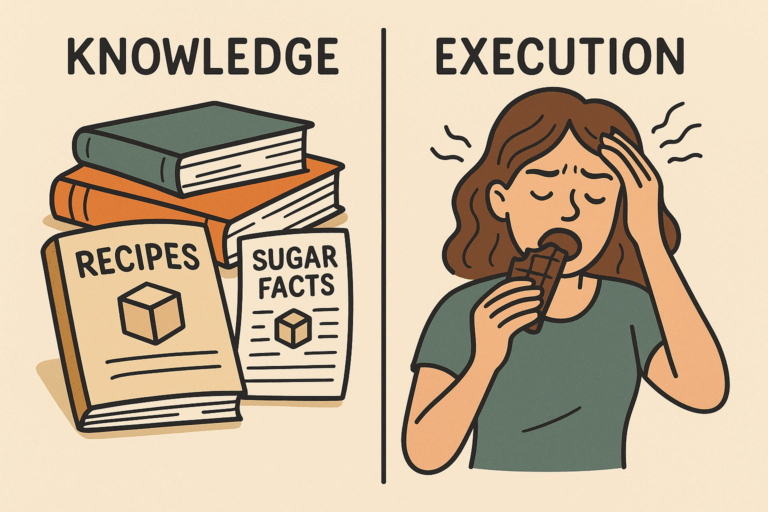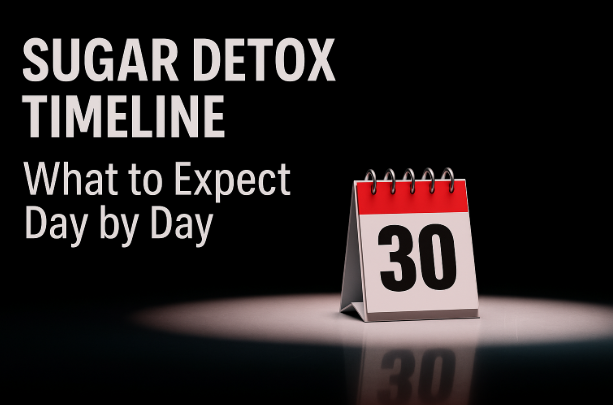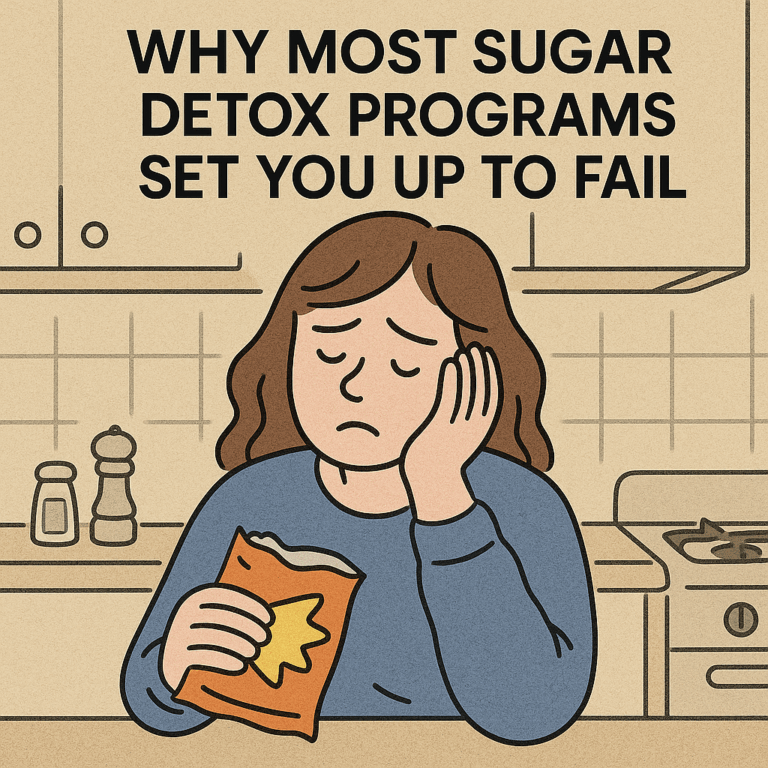By Mike, The SugarFreeMan
Founder of SugarDetox.com and the 30-Day Sugar Freedom Challenge
Can you guess why?
Yeah, it involves a woman.
Emotions are hard to deal with when you’re using substances to numb yourself. It’s like you’re a child who never really matured, and now you have grown-up issues to deal with without your drug of choice.
36 years ago today, I put down all mind and mood-altering drugs for good.
Or so I thought.
I just doubled down on the socially acceptable ones – sugar and caffeine.
For another 3 or 4 years, I OD’d on both. I can’t even tell you my clean date from sugar or caffeine. I struggled for years once I decided to quit – and no one, including me, was counting “sugar-free days” back then.
I do know it’s been over 30 years since I used either, as I have the most gorgeous, brilliant 27-year-old identical twins who never had sugar or caffeine in the womb or till they were six years old.
How I ever talked my ex-wife into that one, I’ll never know.

After helping thousands of people quit sugar over these decades, I can tell you this: of the 100 or so who had quit drugs and alcohol first, then quit sugar – almost 100% said quitting sugar was harder.
Let that sink in for a minute.
This article was review by Dr. Camela McGrath, MD, FACOG. Find more about her here
Why Sugar Was Harder to Quit Than Drugs and Alcohol
Over the years, I’ve seen every possible incarnation of a sugar addict known to man. I’ve helped thousands of people quit, and my life has been altered by the journey.
Some folks say I’m extreme.
The folks who join me in the sugar-free life say, “Thanks.”
My fellow recovering substance use mates used to call me “the weird addiction specialist.”
LOL – I kind of liked that name.
But here’s what we discovered after quitting drugs or alcohol, then trying to quit sugar:
Quitting sugar is harder. Period.
And if you’re thinking, “That can’t be true, drugs are way more serious,”
you probably haven’t tried to quit sugar yet – or maybe you’ve tried and failed, which is exactly why you’re here.
Why Recovery Addicts Say Sugar is the Hardest Addiction to Break

1. You Can’t Avoid Sugar
When you quit alcohol, you don’t go to bars.
When you quit drugs, you avoid dealers and using friends.
But sugar? It’s everywhere – at gas stations, parties, offices, and holidays.
You literally can’t avoid it because it’s sold in the same places that sell food you need to survive.
2. Society Supports Your Addiction
Nobody offers a recovering alcoholic a beer and says “just one won’t hurt.”
But sugar addicts hear that all the time.
3. There’s No “Rock Bottom” Moment
Sugar’s damage is slow and socially acceptable.
There’s no dramatic event that forces you to change – just gradual decline.
4. Withdrawal Lasts Longer
Physical sugar withdrawal lasts 7–14 days, but emotional cravings can last months.
You’re not just detoxing – you’re rewiring decades of emotional patterns.
5. It’s Tied to Every Emotion
Sugar is woven into our emotional DNA:
- Celebration = cake
- Comfort = ice cream
- Reward = candy
- Love = chocolate
- Stress = cookies
- Boredom = snacks
You’re not just quitting a substance – you’re dismantling your emotional coping system.
6. The Medical Community Doesn’t Take It Seriously
Tell your doctor you’re addicted to alcohol – they’ll help.
Tell them you’re addicted to sugar – they’ll tell you to “eat in moderation.”
Yet science proves sugar activates the same reward centers as cocaine.
(NIH research link)
So be kind to yourself. This is no easy task.
The Problem With Socially Acceptable Addictions
After I got clean from drugs and alcohol, I thought I was done.
I was proud – 36 years proud.
But I just transferred my addiction to sugar and caffeine.
No one told me it was a problem – they were legal, accessible, and normalized.
But the truth?
I was still using substances to numb emotions. I was still addicted.
The Trap of Substitution
This happens all the time in recovery:
- Quit drinking → start smoking
- Quit drugs → start overeating
- Quit smoking → start eating candy
- Quit everything → obsessed with sugar and caffeine
Because the real issue isn’t the substance – it’s how we cope with emotions.
Until you learn to feel instead of numb, you’ll just switch addictions.
That’s why sugar becomes the final frontier of recovery. Join our 30-Day Sugar Detox Challenge.

The Yo-Yo Detox Cycle (And Why It Keeps Failing You)
Sound familiar?
January: You detox and feel amazing.
February: You “celebrate” and fall back.
March-May: You regain weight and feel discouraged.
June: You start again.
Repeat for years.
Why? Because short-term detoxes treat addiction like a diet.
You don’t need another 21-day challenge.
You need recovery, not restriction.
The 45-Day Reality Check
It’s time to check in. Be honest:
- Are you still sugar-free?
- Did you slip back?
- Did you not start at all?
If you’re struggling, it’s not lack of willpower.
It’s lack of community.
Would you tell someone quitting heroin to do it alone?
Of course not.
So don’t do that with sugar.
Recovery vs. Dieting
Dieting:
Temporary, weight-focused, isolated, slip = failure.
Recovery:
Ongoing, community-based, lifestyle-focused, slip = learning.
See the difference?
One treats sugar like a food problem.
The other treats it like the addiction it is.
What You Actually Get (Beyond Books and Videos)
Join our Sugar-Free Warriors and you’ll get:
- Meal plans & science-based strategies
- Emotional coping tools
- 24/7 community support
- Real accountability
- Encouragement every single day
This isn’t just education. It’s transformation. Join the 30-Day Sugar Detox Challenge
The Emotional Maturity You Never Got to Develop
When you use sugar to cope as a kid, you never learn emotional maturity.
You’re now 45, 55 – still coping like a 10-year-old.
In recovery, you finally learn to:
- Sit with sadness
- Handle stress healthily
- Celebrate without food
- Feel emotions fully
It’s hard – but it’s how you grow into the emotionally strong person you were meant to be.
36 Years Sober, 28+ Years Sugar-Free: What I’ve Learned
- Addiction is addiction. Don’t minimize sugar.
- Recovery needs community. Always.
- Slip-ups don’t mean failure.
- Play the long game. Recovery > detox.
- You’re stronger than you think.
It’s Time to Put This Behind You
Today, February 16th, marks 36 years sober and 30+ years sugar-free.
I’m not special – just proof that long-term recovery is possible.
Join us.
Be part of the movement.
Stay free for good.
About the Author
Mike Collins, known as The SugarFreeMan, has been sugar-free for over 35 years and is the founder of SugarDetox.com.
He has helped tens of thousands break free from sugar addiction through practical, science-backed strategies.
Medical Disclaimer
This article is for educational purposes only and does not replace medical advice.
Consult your healthcare provider before making major dietary changes.
FAQ
Q: Why is quitting sugar harder than quitting drugs or alcohol? A: People in recovery from both substances and sugar report sugar is harder to quit because: 1) You can’t avoid sugar – it’s everywhere you need to go, 2) Society supports sugar addiction and sabotages recovery attempts, 3) There’s no dramatic “rock bottom” moment forcing change, 4) Withdrawal lasts longer with months of psychological cravings, 5) Sugar is tied to every emotion since childhood making emotional rewiring necessary, and 6) The medical community doesn’t validate sugar addiction or offer serious treatment.
Q: What happens when people quit drugs but still use sugar? A: People who quit drugs/alcohol but continue using sugar engage in addiction substitution – transferring their addiction to socially acceptable substances. They haven’t addressed the core issue of using substances to numb emotions. Sugar becomes the “final frontier” of addiction recovery because until you learn to feel emotions without medicating them, you keep substituting one addiction for another.
Q: Why do short-term sugar detoxes fail long-term? A: Short-term detoxes (7, 21, or 30 days) treat chronic addiction like a temporary problem. They provide meal plans and recipes but lack long-term support, emotional coping tools, community accountability, and recovery principles. When the detox ends and people try to maintain alone, they return to sugar because they never addressed the emotional component or built sustainable support systems. Sugar addiction requires ongoing recovery, not just temporary detox.
Q: What’s the difference between dieting and recovery approaches to sugar? A: Dieting approaches have fixed timeframes, focus on weight loss, provide meal plans, include an end date to return to “normal,” leave you alone after, treat slips as failure, and measure success by pounds lost. Recovery approaches provide ongoing support with no end date, focus on freedom from addiction, include emotional coping tools, understand this is lifelong, offer indefinite community, treat slips as learning opportunities, and measure success by quality of life and sustained freedom.
Q: What role does emotional maturity play in sugar addiction? A: When people start using sugar heavily in childhood to manage emotions, they stop developing emotional coping skills. They never learn to handle sadness, stress, boredom, or celebration without food. Adults struggling with sugar often have emotional coping skills of a child because sugar did that developmental work for them. Recovery requires learning these skills decades late while also breaking physical addiction.
Q: Why is community support essential for quitting sugar? A: Every successful recovery program includes community because information alone doesn’t create lasting change. Community provides someone to contact during 9 PM cravings, people who understand without judgment, proof that long-term freedom is possible, accountability with compassion, real-time crisis support, and shared experiences showing you’re not alone. Without community, people eat sugar during crisis, feel they’ve failed, and give up. With community, they get through cravings and build sustained freedom.






